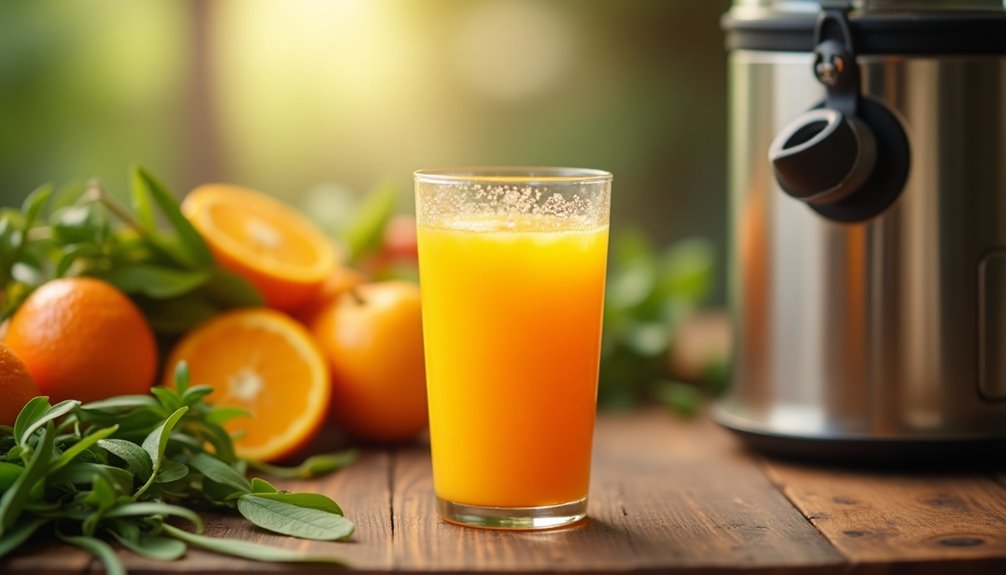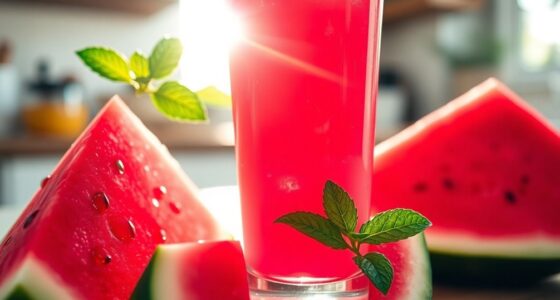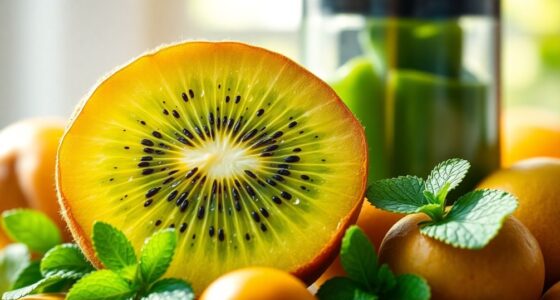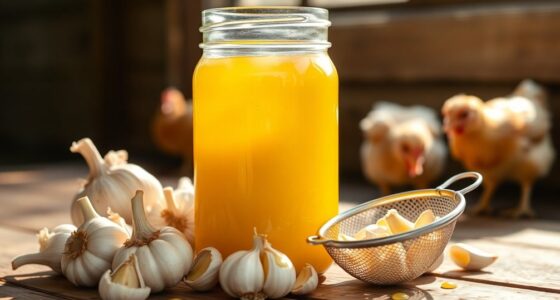Fresh-pressed juice is usually good for about 3 to 5 days when you store it properly. To maximize freshness, keep it in airtight containers and at temperatures between 35-40°F. If you want the best flavor and nutrients, try to drink it within 72 hours. Remember, using high-quality ingredients can also boost its shelf life. If you’re curious about tips for prolonging freshness or the nutritional benefits, there’s more to explore. Additionally, it’s essential to wash all fruits and vegetables thoroughly before juicing to remove any contaminants that could hasten spoilage. If you’re wondering how long is orange juice good after being freshly pressed, the general guideline remains the same—aim to consume it within 3 to 5 days for optimal taste and health benefits. Freezing your juice is another option if you want to extend its shelf life, allowing you to enjoy delicious, nutrient-rich beverages even longer. Freezing your juice can be a great strategy, but it’s important to note that the texture and flavor may change once thawed. If you’re still curious and asking yourself, “how long is orange juice good for” once you’ve frozen it, you can typically expect it to maintain its best quality for about 6 months when properly stored in a freezer-safe container. Just remember to leave some space in the container for expansion as the juice freezes to avoid any spills.
Key Takeaways
- Fresh-pressed juice generally lasts about 3 to 5 days when stored properly in the refrigerator.
- Cold-pressed juice can extend its shelf life to 3 to 7 days under ideal conditions.
- Consuming juice within 72 hours is recommended for optimal taste and nutritional benefits.
- Airtight containers and vacuum sealing can help minimize oxidation and prolong freshness.
- The quality of fruits and vegetables used directly affects the juice's longevity and nutrient retention.

Have you ever wondered how long that delicious fresh-pressed juice you just made will last? It's a common question, especially when you're excited about all the nutrients packed into your drink. Generally, fresh-pressed juice has a shelf life of about 3 to 5 days when you store it properly in the refrigerator. Keeping it at temperatures between 35-40°F (1.6-4.4°C) is crucial. If you want to enjoy your juice at its best, you need to pay attention to how you store it.
The quality of the produce you use plays a significant role in your juice's longevity. If you choose fresh, high-quality fruits and vegetables, you're setting yourself up for a better shelf life. However, how you juice them also matters. Cold-pressed juice can last a bit longer—up to 3 to 7 days—if stored correctly.
An important tip is to keep your juice in airtight containers and away from light to minimize oxidation, which can degrade the nutrients and flavor.
You might be wondering why consuming fresh juice within 72 hours is often recommended. This time frame is key for optimal taste and nutritional benefits. Once your juice is exposed to air, the nutrients begin to degrade, which can affect both the flavor and health benefits. If you want to maintain the vibrant taste and the vitamins in your juice, it's best to drink it soon after making it.
If you're really keen on extending the shelf life of your juice, consider vacuum sealing it. This method can extend the freshness to about 5 to 7 days in the refrigerator by minimizing air exposure. Vacuum sealing prevents oxidation, allowing you to enjoy your juice for a longer period while retaining more of its nutrients. It's an excellent option if you've made a larger batch and don't plan on finishing it all at once.
Remember, how you handle your juice matters too. After juicing, make sure to transfer it to those airtight containers right away. The less air that comes into contact with your juice, the better it'll stay fresh.
Additionally, always check the "best by" dates printed on the labels of cold-pressed juices you buy from the store. Those dates are there for a reason; they tell you when the juice is at its peak freshness.
Frequently Asked Questions
How Long Does Fresh Pressed Juice Last in the Fridge?
When you store fresh pressed juice in the fridge, it typically lasts about 3-5 days if kept at or below 41°F (5°C).
If you don't follow proper handling and storage, it might spoil even faster.
To get the best flavor and nutritional benefits, aim to drink it within 72 hours.
How Long Can Freshly Squeezed Juice Last in a Mason Jar?
When you think about freshly squeezed juice, it's tempting to savor it right away, but storing it properly makes a difference.
In a mason jar, your juice can last 3-5 days in the fridge if you keep it airtight and fill it to the brim to limit air exposure.
For longer storage, consider freezing it, which can maintain its nutrients for several months.
Just remember, freshness is key to enjoying its full flavor!
Can I Drink Pressed Juice After a Week?
You shouldn't drink pressed juice after a week.
By that point, it may have lost its nutritional value and could pose a safety risk. Even if it looks and smells okay, it's best to err on the side of caution.
Fresh pressed juice is at its best within a few days of making it.
Always trust your senses—if you notice any off-smells or color changes, it's safer to toss it out.
How to Know if Cold-Pressed Juice Has Gone Bad?
You might think you're sipping on liquid gold, but that cold-pressed juice could be a science experiment gone wrong!
To tell if it's bad, check for an off smell or unusual color—if it smells like a gym sock, it's time to toss it.
Bubbles mean fermentation, and slimy textures are a definite no-go.
Always trust your senses; if it looks or smells funky, don't risk a mouthful of regret!
Conclusion
In conclusion, fresh pressed juice is best consumed within 3 to 5 days when stored correctly in the fridge. For instance, imagine you've just made a batch of vibrant green juice packed with kale and apple. If you drink it within a few days, you'll enjoy its peak flavor and nutrients. But if you let it sit for a week, you might find it tastes off and lacks the vibrant energy you're after. Enjoy it fresh!
Cindy thoroughly researches juicing trends, techniques, and recipes to provide readers with practical advice and inspiration. Her writing style is accessible, engaging, and designed to make complex concepts easy to understand. Cindy’s dedication to promoting the advantages of juicing shines through her work, empowering readers to make positive changes in their lives through the simple act of juicing.











